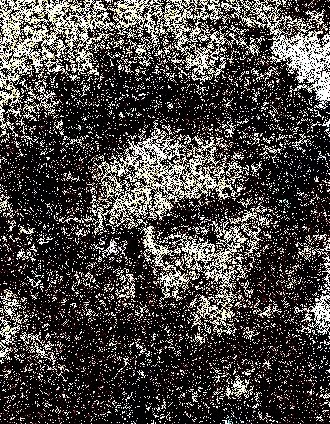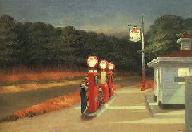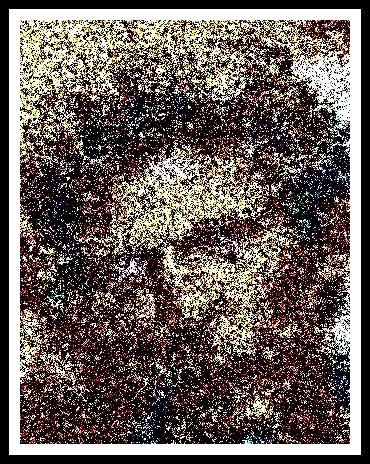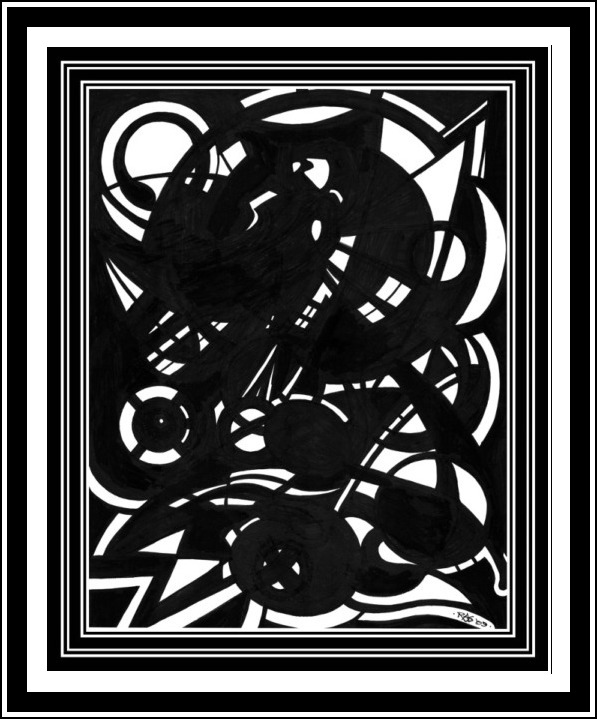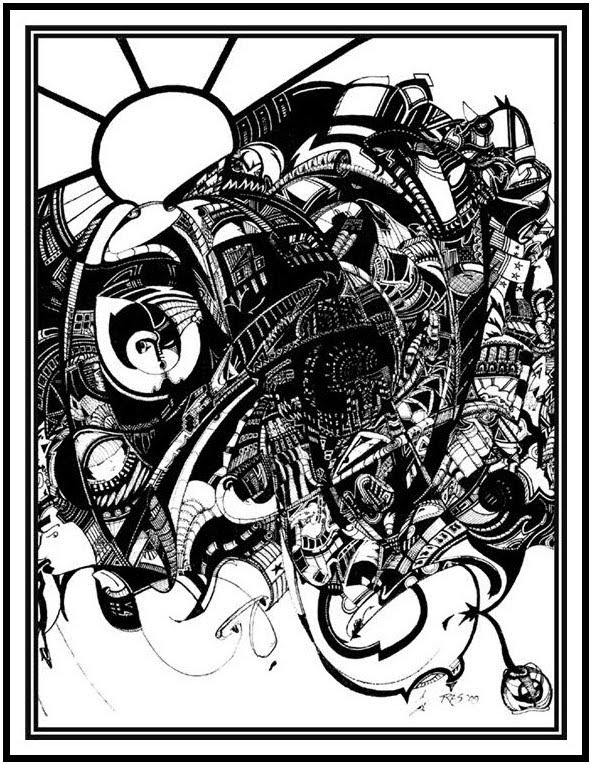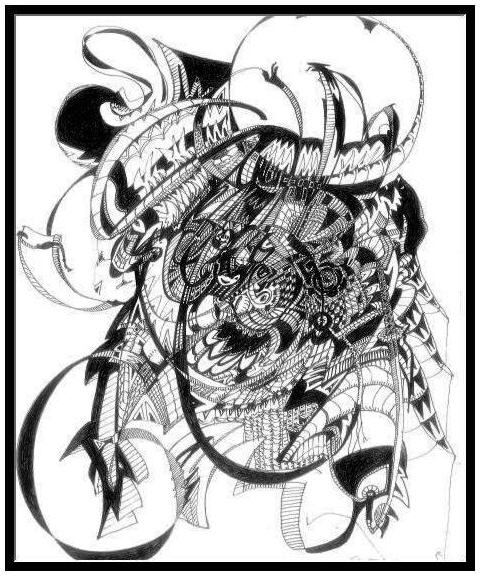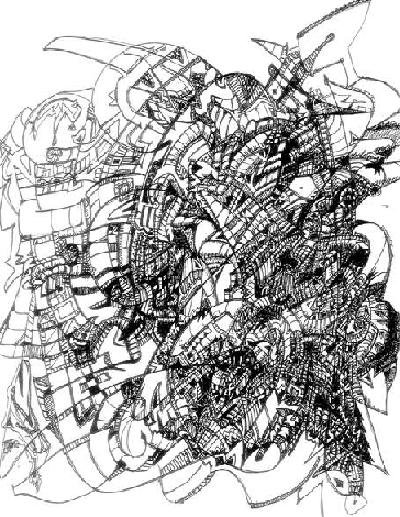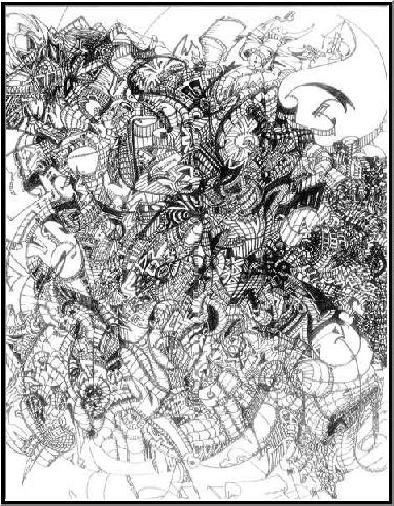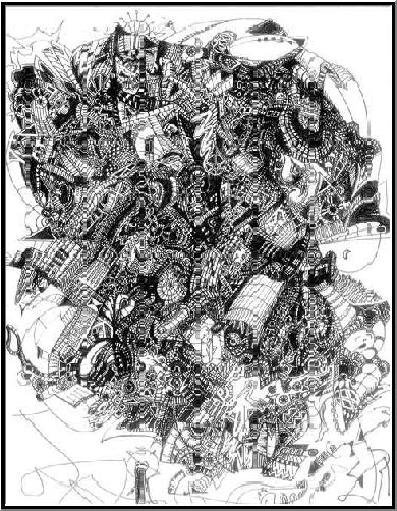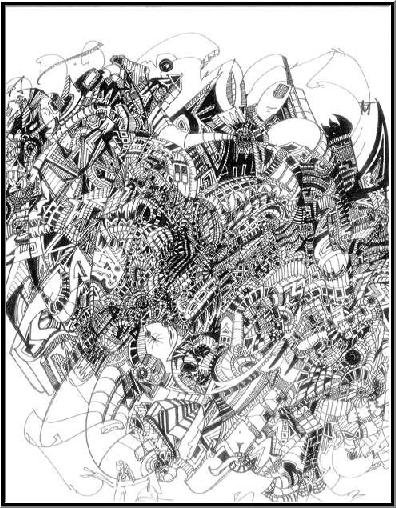Dang, I never thought you'd go so willingly, I thought you had to have a tougher hide than that. Just a word from me, and you're gone. Within two weeks of my nasty letter about that shit you published of Joni Mitchell, you really did step down (see ALICE QUINN and JONI MITCHELL right here in this blog). Well, it's for the best. You had a decent run. And I noticed a good pick once in a while, and it was always fun to lambast your hallowed name, along with that hopeless wanker Ashbery. Too much unearned praise and offered way too soon.
Muldoon's an excellent choice for your successor. Hey, I practically know the guy. I wrote him twice before, he wrote me back once. Just this morning when I dropped a little congratulations in his lap for taking over as new poetry editor of The New Yorker, in your stead, he wrote me back again. He's sure going to know my name, Alice; when you see it up there in lights, remember, I'm the one that brought you down.
--R Skogsberg


shepard fairey



ras

ras

ras

ras
ras
ras

ras

gustav dore

our boys

death and burial

wm
Sunday, September 23, 2007
ALICE QUINN AGAIN
Have I Told You
of the flame that scorched our leavings, we weren’t twenty
seconds gone. And in that small interval, it loomed before us like
a monument to love gone down and under; to where no man can say
whether when we began, we knew, or didn’t, what we’d come up with.
Reach around my neck, darlin’, I can kick enough for two. Lay your
soft neck over my shoulder and remember how it was, the way we
etched it into our skin, so we’d find it again when we’d lost it.
That ink is fading, instinct’s taking over. The new rule is
nothing, that’s all.
See my fingers twitching toward you? That's the best of my repose.
Which sounds good, but I need to move off these crooked stumps and
into your healing hands. May they guide us to safe harbor, or
at least to sand. I can crawl out. I done it before. So did you.
--R Skogsberg
Friday, September 21, 2007
A Willingness To Be Shaken
is required of adventurers, lest their minds be lost in that dark
dot at the edge of the soundless scream, or taken by the heavy clatter
of the falling blade. Each of us is into it up to our elbows and knees.
Shame hot on our faces, we grasp the somehow still warm tatters of a self
no one could want, least of all anyone of this crew, which I can tell
has standards. I’m walking away from that cheap suit like class always does,
with ceremony.
--R Skogsberg
Thursday, September 20, 2007
DMT Testimonial
I had wrestled with and come to terms with (I thought) the oft-mentioned “alien” thing over a series of psilocybin sessions in '94. And, besides, I thought I had experienced (if not entirely inculcated) a fair sampling of whatever there was of this Cosmos in these many arduous, exultant sessions, conducted over many years.
However, the enormity and characteristically "other" intensity of the DMT experience was entirely new to me. I must emphasize the "other" quality. LSD, psilocybin, mescaline--even PCP--these all seem as one with our familiar nature-based reality, reflecting the glory of human consciousness as conveniently identical to its (as it turns out, alas!) local God.
And therein was the surprising quality of DMT. Its reach and power were so vast as to make human understanding laughably impossible; which came as a relief, actually, after so many years of trying. Also, it rendered ordinary hope foolish. Which was also releasing, not the negative it sounds.
Anyway, it was a fair trade for a look behind the curtain at something that may be beyond the human mind's ability to grasp or even come to spiritual terms with (now that seems alien!). It certainly seemed so to me.
This whole alien thing is somewhat of a vexing counterpoint to perceived human consciousness. Which seems inexorably married to, and catalyzed by, that very alien element, and which marriage of the two produces this world before us as we know it. In other words, we are all half-alien. Relax.
At least that's the mushrooms’ story. . .
DMT's seems to be "I'm big, and I'm bad, and I'll eat you up. However, you may be grateful for both the humbling and the releasing."
The initiatory aspect is likewise pronounced proportionately to the face-eating intensity, and but for the clearly alien character, that’s probably its chief contextual element.
Re your words: "but illustrated the culminating point of shamanic initiation (being torn apart by the spirits). The more alien the spirits were, the more arduous the experience got, the stronger effect the initiation had."
Quite so. In the most powerful psychedelic sessions (these actually do require “heroic“ dosages—and, it should be stated—an entirely different experience is just waiting there to be had), three elements typically present themselves at some point (or at several points).
1) How long can this go on?
2) How can I ever find my way back to sanity?
3) And: Oh my God, this is the most incredible, stupendous, fantastic, etc.
Although DMT is typically described as having perhaps only 2-5 minutes of pure intensity, and a gradual 10-30 minute return to “norbal,” my first 1 and 1/2 lungfuls had me deep in the throes of all three of the above, I guess mostly in that order, and for far longer than advertised.
When things started to lighten, I had a momentary thought (why?) that perhaps I'd not gotten enough, and motioned to the pipe-bearer for more. Halfway through that toke I was rocketed inwardly far beyond what only moments before had seemed the very apotheosis of human experience. I'd had only a split second to recall (too late!) that I had been waiting for it (at some time) to be over. Then it was head over heels into the maw of the machine.
This lasted a full twenty minutes easy. An hour later I was just barely functional. There was a residual effect for several weeks as well. Nothing too pronounced but enough to put one slightly askance to one's usual world view.
But even without any particular purposeful ritual but the showing of appropriate respect, the initiatory element was the very cloth and context of the entire experience: the commencing, the catapulting, and the re-configuring taken forward.
Likewise, with no conscious effort to make it so (thank god that was not asked!), the pipe administrator was both the most integral, and most compassionate, of priests. No blood spilled over this stone, no stone knife acted as if it knew the way to home.
And the gathered few—most of whom, though not partaking, were personally acquainted with the experience—became merely by their presence, their overheard voices, their support, their welcome sudden laughs, the most eternal of one's own spiritual brethren, fellow acolytes of this least-transcribed of religions, whose only credo is: Everyone should do this
. . . at least once.
And this does not pass.
--R Skogsberg
Wednesday, September 19, 2007
a message from GEORGE CARLIN
His wife recently died)
----------------------------------
The paradox of our time in history is that we have taller buildings but
shorter tempers, wider freeways , but narrower viewpoints. We spend
more, but have less, we buy more, but enjoy less.
We have bigger houses and smaller families, more conveniences,
but less time. We have more degrees but less sense, more knowledge,
but less judgment, more experts, yet more problems, more medicine, but less wellness.
We drink too much, smoke too much, spend too recklessly,
laugh too little, drive too fast, get too angry, stay up too late,
get up too tired, read too little, watch TV too much ,
and pray too seldom.
We have multiplied our possessions, but reduced our values.
We talk too much, love too seldom, and hate too often.
We've learned how to make a living, but not a life.
We've added years to life not life to years. We've been
all the way to the moon and back, but have trouble crossing the street
to meet a new neighbor.
We conquered outer space but not inner space. We've done
larger things, but not better things.
We've cleaned up the air, but polluted the soul.
We've conquered the atom, but not our prejudice.
We write more, but learn less. We plan more, but
accomplish less. We've learned to rush, but not to wait.
We build more computers to hold more information, to
produce more copies than ever, but we communicate less and less.
These are the times of fast foods and slow digestion, big men and
small character, steep profits and shallow relationships.
These are the days of two incomes but more divorce, fancier houses,
but broken homes.
These are days of quick trips, disposable diapers, throwaway morality,
one night stands, overweight bodies, and pills that do everything from
cheer, to quiet, to kill.
It is a time when there is much in the showroom window and
nothing in the stockroom. A time when technology can bring this
letter to you, and a time when you can choose either to share
this insight, or to just hit delete...
Remember; spend some time with your loved ones, because
they are not going to be around forever.
Remember, say a kind word to someone who looks up to you in awe,
because that little person soon will grow up and leave your side.
Remember, to give a warm hug to the one next to you, because that is
the only treasure you can give with your heart and it doesn't cost a cent.
Remember, to say, "I love you" to your partner and your loved ones, but
most of all mean it. A kiss and an embrace will mend hurt when it comes from deep inside of you.
Remember to hold hands and cherish the moment for someday
that person will not be there again.
Give time to love, give time to speak! And give time to share
the precious thoughts in your mind.
AND ALWAYS REMEMBER:
Life is not measured by the number of breaths we take, but by
the moments that take our breath away.
If you don't send this to at least 8 people....Who cares?
--George Carlin
Tuesday, September 18, 2007
One Seeks A Sign
Lacking such specs and technical diagrams the best I can make out
is you begin here. I’m spread way across your future but here
we’ve not even met; we should probably make our way to a help center
as quickly as possible if you see one that isn’t abandoned. I don’t think
anyone is coming to straighten this out. We’ll just have to make the most
of the last few minutes. Stay alert and remember your training.
Look, already the stain begins to move. See its tendrils reaching to you
for a cure; we’re about to either disappear in a confluence of matter and
anti-matter or we’re off the charts and into completely new territory.
Either way I would pretend to be oblivious to their desperation. Otherwise,
they’ll get all worked up and getting them back into the jar in time will be
practically impossible. Better they sleep and dream and never wake
until next cycle. Look, just take the jar. I’m off until the end-days.
--R Skogsberg
KIDS OF THE BLACK HOLE
Fans, I've got a real treat for you tonight. Every once in a while you run across a writer who's expression is transparent and egoless as water. I've found only four or five in a life long already, and the only one I can think of right now is William Maxwell, longtime fiction editor of the New Yorker. Anyway, the prose of these few is honest and flat as a damn day can stretch.
We become by our own natures, and theirs, their acolytes, urging them to speak for us in a way that we can't, at least out loud. Well, friends, I've found another. All I know about this piece is that it's one chapter of seven I have curled here at my feet, and it takes place sometime in the 80's on the streets of Burlington, VT, which, if you don't know it, is a sweet place. Six or seven colleges abounding, downtown a 6-block, no-cars strip with street performers packed end-to-end, live music from the clubs blasting from every window, and with plenty of ramshackle barely outlying ghettos to house its itinerant children. It can be a real groove in the summer.
And who is our unassuming scribe?
I have a name (a pseudonym?) on these crumpled, coffee(beer?)-stained pages. All I know from asking around is: he's supposed to be somewhere in his thirties by now, perennial vocalist in a thousand hardcore bands, an old-school romantic for all his fast-fleeted youth, I hear, who died again and again, like no quits, over every righteous woman he ever encountered. I've consumed this eventually truncated diary end-to-end, and every chapter gets better, that is, less nasty. Ain't that where we want our lives to head?
Enough from me, chickens, dig this:
KIDS OF THE BLACK HOLE
by Sterling Dew
There are reasons why I don't trip. Of course, sometimes it takes a trip to make me remember those reasons. I used to try to convince myself that mushrooms might be a better time then LSD, smoother, less edge. Then, an hour and a half later I’d be twisted out of my mind. For me they are pretty much the same harrowing deal. I also used to think that maybe if I ate a whole shitload of acid at once, it would be a better trip. HA!
It almost did work once, though, when I ate nine hits of blotter. I had a great time then. Five hearts and four worlds. The worlds each had a small picture of the Earth on them, and the hearts, a little red heart, of course. I remember lying in the field in Rochester, on my back in the grass. It was mid-summer and very windy. The tall grass swayed and fluttered around my head as I stared up at the clouds, which seemed to be rushing by at ridiculous speeds and moving in multiple directions. I remember lying in the blazing sun for hours entranced by this endless chase, just content to watch them whipping about.
Nick was tripping with me that day. He'd also had a nine-tab breakfast but hadn't stomached it as well. The clouds didn't move for him, just the ground. There was a door in my mom’s living room that we never used. No stairs led to it, only a drop-off of four feet to the ground below. Nick lay on the floor and puked out the door as we listened to D.I..
There was one song in particular that was really messing him up. It was slow and droning, and somehow soothing to me. He blamed it for making him sick. It was called Purgatory2. Later when Nick was feeling more like himself he collected the tabs he had puked up and sold them to Lenny who tripped his ass off too.
So, that was a pretty cool trip, but usually, it’s not like that. As soon as that shit’s down my throat, I know I've fucked up.
For awhile it's OK. I laugh until my face hurts and say a lot of stuff no one but me understands. Or at least if they do, I can't tell. After awhile though, I've had enough, and I just want it to end. I'll start to feel really cold and somehow discontent, or I'll look down at myself and realize that I'm all dirty. Usually, it's only my imagination. It's not so much that I've ever had a bad trip as it is that I've never had a really good one. One trip comes to mind that was particularly fucked-up. . .
I was staying with my friends Jeffrey and Trev at the time. They lived in what was pretty much just a punk rock crash pad. Every night it was beer, chaos, laughter, and tears. Every night was carnage. The floor had soaked up so much booze that the house itself was probably fucked-up. Every morning there were kids sleeping all over the floors. Sometimes none of us even knew who they were.
That being the way it was, none of us were really surprised when Jeffrey picked up a sheet of blotter off the floor.
"Hey! Look, acid," he said, sounding somewhat uninterested. We all smiled knowingly. Although none of us were really big on tripping at that time, we all knew the value of one hundred hits of LSD.
That afternoon Trev took the sheet downtown and sold it off piece by piece. Jeffrey was kind of reluctant to let Trev take it. He'd been the one to find it, after all. It's not that he really cared one way or the other. He would have actually preferred for Trev to go sell it, buy beer, and pot, and bring it back to the house. But Jeffrey was the kind of guy who was always a bit on the paranoid side, always afraid that someone might be trying to take advantage of him. And so, when Trev asked for it, Jeff was immediately on the defensive. Trev was forced to present it in a way that allowed Jeff to feel like he was doing a huge favor for the entire crew, one that would be long remembered.
Trev returned nearly four hours later with the following items: two cases of Budweiser, one eighth of an once of high grade marijuana, four rolls of toilet paper, two packs of Best Buy cigarettes, nine American dollars, and an ugly skinhead called Grudge.
Grudge had come up from D.C. trying to avoid some kind of trouble he was in. He was a real friendly guy, despite his menacing appearance. Trev had picked him up somewhere along the way and it appeared they were already fast friends. Grudge introduced himself to the room, then immediately pulled down his bottom lip so it hung like a bulldog’s. On the inside of his lip the word ‘Grudge’ was tattooed in dark black ink.
"Don't fuck with da Grudge," he growled, and we all burst out laughing.
After a case of beer and a couple joints I was fucked-up enough so that it wasn't hard for Trev to convince me to eat some of the remaining blotter. Jeffrey was all for it, too. As for "the Grudge," I suspected he would consume anything we put in front of him.
As always, as soon as it was in my mouth I knew it was a bad idea. Fuck, fifteen hours of tripping coming up, and already Jeffrey was starting to make my skin crawl.
He was the type who loved the sound of his own voice. It was near impossible to get him to shut up normally, when you got him on drugs it was twice as rough. He had a million and one stories and most of them we had all heard before. Of course that never bothered him. He would just continue droning on. Usually I didn't have the energy to respond.
After awhile Jeff was getting restless. So were the rest of us, but that was OK with us. For Jeffrey to be restless was a very dangerous thing. He was telling a story about when he shot a bottle rocket at his brother and singed off a clump of his hair and damaged his hearing. We had all heard it before. All of a sudden he got a mischievous look on his face and dashed into his room. He returned with a box with a couple of M-80 firecrackers in it.
No one wanted to play with Jeffrey anymore after hearing his plan to blow up the neighbor’s car by putting an M-80 in the gas tank. I didn't doubt that he would try it. He was a true fucking nut. I'd seen him do a lot of crazy shit, also a lot of stupid shit. One time I saw him jump off a second-story porch chasing after some girl who had dumped him. And he had only dated her for like two weeks. He broke his ankle that time. I didn’t think he would live past the age of twenty-five. Still, we all knew better then to try to talk him out of anything.
I was kind of relieved when Grudge went with him. I hoped Grudge would watch out for him. Of course, I don't think that's what "the Grudge" had in mind. I think he just didn't want anyone causing trouble without him. After they were gone we made bets speculating if either of them would come back and if so in what condition.
It's weird the way sound is affected sometimes when you are tripping, particularly music. Next door some rednecks were drinking and listening to Motley Crue, or some such shit. Their voices faded in and out with the music. First the voices were louder, then the music, then the voices again. Not like someone was turning it up and down but more of a battle between two different types of sound. It was a constant vibrating of the sound waves. It was almost like you could see the sound waves coming in the open window. After awhile it began to get really strange so we threw on our own music to drown it out.
This time the sound was right in our faces, but still it wavered in and out. And still, it threatened to drop into the background. At any second I expected the music to just die and the record to keep on talking. Not singing or screaming, just talking, droning on.
At this point, I could definitely see the sound waves. I knew then why they were called sound waves. They seemed to roll out in a half-circle shapes from the stereo. They were clear and yellow and just barely visible. Maybe they were not even visible but almost visible. At any rate, I was aware that they moved like waves. We sat and watched and listened for a while but that got weird, too, so we decided to try the TV.
The neighbors had also shut off their music, and apparently had left. As we started for the living room I wondered what had happened to Jeffrey and Grudge. At that very second from outside came a huge bang. It sounded like a gunshot. My breath stopped. Trev and I both stared at each other. His chubby face had turned slightly pale.
"SHIT" he said, in alarm.
I knew what he was thinking. I was thinking it, too. Jeffrey had finally met his demise. It was only a matter of time, after all. I was kind of surprised he had lasted this long. It would be a shame if he had taken poor Grudge with him. I had a bad feeling that it was the end of him. The end of his stories, the end of his lunacy, his binge drinking, of his pissing in the trash can when he was too wasted to make it to the toilet.
I didn't have time to mourn him before he burst in the door already telling the story of what had just happened. Grudge followed grinning.
"Yeah man...bang! You should have seen that,” he exclaimed excitedly. “I couldn’t get the gas cap open so we threw it in the tail pipe. I dropped it on the first try so I picked it up and threw it in and the thing went off practically in my hand..."
He rambled on about for this for a few minutes until he had exhausted himself. He rested for a couple of breaths and followed up with a dull matter-of-fact statement.
"Oh yeah, we saw Gandhi, he says there’s a party on Maple Street."
"Whose party," Trev sneered, looking doubtful.
"Who cares," said Jeffrey, smiling.
It was near 10:30 by the time Jeffrey and Grudge had convinced me and Trev to brave the outside world. We pounded the last few beers down and set out into the night.
We didn't make it far. Blue lights flashed in the street, flickering off the ramshackle buildings of the Old North End. "They're at the neighbor’s house," Trev reported grimly.
“Friends of yours?" I asked Jeffrey.
"Relatives," he replied.
We decided it wasn't the right time to meet Jeffrey’s "relatives" so we hid on the porch for a few minutes. The neighbor was bitching to the fuzz about someone trying to blow up her car. We listened intently wondering what kind of sicko would do that kind of thing. When the complaint was concluded we made our way silently out into the night.
As we walked across town I was acutely aware of the city’s presence. Voices, sirens, laughter, music, loud cars, it all seemed amplified. The city seemed to be one living, breathing, squirming, writhing, babbling entity. Noises crawled from every house, murmuring an endless cacophony in which one voice or group of voices constantly vies to drown out another. Every once in awhile I'd shy or cringe, thinking they were talking to me.
As we made our way across town it seemed like a lot was going on. College kids were yelling and hooting as they made their way into and out of the bars. Carloads of young girls patrolled the streets. People passed by hurriedly, glaring at us with impossible-to-explain expressions. And of course the cops were everywhere.
The flashing blue lights were always there in the corner of my eye. The trouble seemed to follow us. I didn't always see a cop car, but I could always see the blue lights flashing away. It was kind of unnerving. By the time we reached Maple Street, I was ready to go back and hide in the apartment. So, I was pleased to find that the party was nothing more then a dark, apparently empty, house.
We knocked on the door a couple of times anyway, since we had come clear across town. No one answered, so we turned and started home. I was happy because I hadn't wanted to go to the party anyway. But I had needed to get out of the apartment. Now I knew what was out here. And I knew I didn't want to be a part of it. I had made the attempt. Now I could hibernate without feeling quite so lame.
The walk through town was insanely worse on the way back. The city’s vibe had turned from somewhat menacing to outright hostile. The voices which before had sounded excited now sounded angry and threatenng. I was surprised to find myself intimidated by a woman who was screaming at her kids as we passed. I expected her to turn on me.
Trev led us on what he called a shortcut. It was really longer but it enabled us to avoid the main bar strip, which was fine with me. It did, however, lead us through the back parking lot of "The Chicken Bone." It's a pretty OK place nowadays, but back then it was redneck heaven. I probably had more teeth in my mouth then all the people in that place combined. More sense too.
As we passed we could hear noises of violence coming from inside the door. Apparently there was some sort of scuffle going on inside. As we approached, a man bolted out of the door, heading straight for us. At first I thought he was going to try to attack me personally but he pushed past me and went for a red pickup truck that was parked in the lot.
A second man, with a pool cue in his hands, pursued him. He pushed past us angrily, and smashed the cue over the first guy’s back. It splintered in half as the guy fell to his knees. The attacker continued to beat him with the broken shaft as the victim huddled into a ball and threw his arms over his head and ace for protection. The beating went on till the guy was bloody and broken. He murmured sobbing pleas as his attacker stepped on his head.
We had all seen enough.
More than anything now we just wanted to get home. It felt like the whole town had turned crazy, and it was out to get us. The animals were in a feeding frenzy. Drinking, fighting, fucking. It was like a pack of wolves. Anyone who showed weakness became prey. I was feeling like a very weak wolf. More of a puppy dog really.
I hoped not to draw any attention since it seemed that any and all attentions were negative. But it was hard not to attract attention with people like Jeffrey. His hair was bright blue and spiked up in about twelve points. They sprang like 7-inch nails out of his head. He wore a thick chain for a belt, clasped with a padlock, and he was heavily tattooed. And this was 1987, not 1999.
The Grudge didn't exactly blend in either, with his steel-capped Doc Martens, bright red braces and cleanly-shaven head. To the average citizen we looked like a fucking walking circus, something to laugh at, or something to fear, a freak show, at best--at worst,a menace. I smiled to myself finding some satisfaction in that thought.
It didn't take long before someone sensed our fragile state of mind and decided to test our will. It wasn't much, just a subtle little derivative statement uttered by a passerby. Unfortunately, Jeffrey decided to turn around. Before I realized what was going on, he had followed these guys over to their car and was arguing with them angrily.
In a way, Jeffrey craved violence even when he was the one receiving it. Or, maybe, especially when he was the one receiving it. He had been in more fights than most of the people I knew all together, and he had come out on the losing end every time. I mean, sure, he had stories of fights where he had kicked their fucking asses, but there weren't ever any witnesses, so they would forever be just stories. People who didn't know him were sometimes intimidated by his vicious bark and crass attitude, but the truth was, he was kind of a pussy. Unfortunately, neither of these two guys seemed moved by Jeffrey's bluster.
They were both fairly big guys, one was shorter than Jeffrey but was a lot more muscled. The other had Jeff dwarfed. Probably frat boys headed home after a long night of drinking and fucking with people. At any rate they were not amused now that Jeffrey had drawn their attention.
The larger one hit Jeffrey hard in the head from behind. He must have used some sort of blunt weapon because Jeff went right down, face first. He must have been unconscious before he even hit the ground because his hands made no attempt to stop his face and forehead from colliding with the gravel. He didn't move either as they stepped once each on the back of his head, then jumped into their car.
As they drove away Grudge shouted all kinds of insulting remarks. Trev and I gathered up Jeffrey, who was a bloody mess. We dragged him to his feet and carried him to the sidewalk. Grudge was now walking towards the frat boy’s car which had stopped at a red light at the end of the block. Grudge began to hesitate as it became clear the car had to stop. It was like he wanted to stand up for his friends but he didn't really want to fight these guys. The larger jock got out of the car and charged at Grudge. Grudge backed up kind of timidly.
Now, truth was, normally the Grudge was a badass, you could tell, but he was heavily dosed, and tripping has a way of making you unsure of yourself, or at least less violent. Grudge fell back against the brick wall of a building as the guy collided with him. They wrestled a bit but neither one could get the upper hand. Grudge wasn't able to do much except to protect his face from the guy’s blows. The other jock honked his horn as the light turned green, and the one assaulting Grudge ran to and jumped into the car.
As they drove off Grudge began to yell insults again and flipped them off.
It took all three of us to scrape Jeffrey off the pavement. He was in bad shape. He was bleeding from his eyes, nose, and mouth, and he had cuts on his lips and forehead. It was hard to look at him. His nose and mouth were not too bad, but Christ, he had blood coming out of his eyes.
As we walked home he stared at the ground and mumbled some indecipherable shit. Trev and I were pretty much carrying him. His legs moved but they would not have kept him standing without us. People cast us horrified glances as we passed. We were looking a bit out of hand.
After about fifteen minutes of walking in silence Jeffrey grunted and managed to croak out a word through his blood-caked lips.
"Wait" he said in a broken voice.
"What" I asked.
He looked at me with a horrified stare. His eyes seemed to see through me, as they saw through the blood that clouded their blackened orbs.
"Where am I?" he gasped, then stared again at his feet not caring to hear the answer.
When we got home we cleaned up Jeffrey’s face with a warm washcloth and lay him in his bed. Trev fed him some Percocet in hopes of knocking him out. We didn't know what else to do. There was no way we were going to bring him to the hospital, although we probably should have.
After we were sure he was going to live, at least for a few hours, we took a walk down to Battery Park. It was less then a block away and the outside world seemed somehow less hostile now. It was a warm summer night and the wind was blowing. At the park was a large stone pavilion. We climbed onto the roof of it and sat for awhile staring at the stars and at the lake.
The steady flash of the lighthouse off the shore was a welcome change from the wildly flashing police lights of downtown. The lake was shimmering beautifully in the night, as were the stars. We smoked the last of the weed, Trev, Grudge, and I, and talked until we came down. We talked about our fucked-up night and about one thousand other fucked-up nights and finally laughed the whole thing off.
About a week later Grudge and I were walking down Main Street when we spotted the guy he had scuffled with, the guy who had fucked up Jeffrey. He was walking with his girlfriend, eating a slice of pizza.
The Grudge slipped on a pair of brass knuckles he'd been carrying around with him, walked up to the guy, and smashed him once in the side of his mouth, knocking a bunch of his teeth out before the guy even knew what was happening. As he lay on the ground spitting out teeth and blood, Grudge turned to the guy’s screaming girlfriend and pulled down his lip, exposing his tattoo.
"Don't fuck with the Grudge." he said, smiling a big friendly smile, and we quickly walked away.
--Sterling Dew
Sunday, September 16, 2007
Beneath Tall Pines
by a wide ambling brook strewn with armful-size
stone dry as cactus and as dusty upside, but halfway
down, in deep shade, the watery underworld mirrored
multitudes of inverted blue mornings to us, trees spiking down,
as if to say, here you’ve been; what is it saying now but
into that disappearing will our individual selves chase the very
idea of it, which was revolutionary, forget a work of genius,
albeit unfulfilled? Until his death, then; and then did he reign?
Christ, they put his likeness on the penny of the realm.
Every time you made change you could see him there
like a heart out of its hole—in the night only may the
beast be slain, he could have told them any time
if they’d asked.
--R Skogsberg
Friday, September 14, 2007
JUST SITTING -- TO AN INMATE
1) Sit comfortably. I don’t imagine kneeling works for you as it does for me after 18 years of it in Aikido. I’ve never been comfortable sitting cross-legged, although that’s good too, if you can manage it. But most important is to provide a way for the spine to straighten as it relaxes with practice. This means finding a middle ground between a) the hara (in Japanese, the center of one’s being, both physical, and psychic—two inches below the navel, within the abdomen) and pelvis being thrust all the way forward (as if the entire spine is perpendicular to the thighs) and b) the hara and pelvis not engaged and slumped all the way back curving the bottom of the spine. In other words, more towards ‘a)’, avoiding ‘b)’ but not extremely towards ‘a).’ Keep in mind with all this: take the middle path through everything. Balance between all extremes.
So, I recommend you sit on the edge of your bunk, feet on the floor, and accept as a first principle that posture is important, and is one of the things you will be keeping an eye on, though you won’t be trying to fix it. With the posture it’s more of an allowing. A good guide is to imagine a string running from the top of the head, pulling it up. DO NOT however stretch the neck in any muscular fashion to accommodate that image. Just check in with it now and then.
2) Keep in mind, as an overarching principle: You are ‘just sitting.’ That’s the real truth of it, nothing more. It’s handy to know that this is the apotheosis of Zen meditation, especially when you close your eyes and it looks like War of the Worlds in there, or when you struggle to concentrate, or of any kind of phantasmagoria takes you over, remember, all those are simply products of the mind, whereas you are JUST SITTING.
3) Here is the nut of the practice, the guide, as it were, that you can always count on to not only keep you on point but to every day advance your practice. WATCH YOUR BREATH. Especially, at first, just watch. Ascertain to begin with whether you breathe properly. This is simply a right or wrong evaluation, easily made. Refinements are possible later on, but most basic and critical is: ask yourself, as you breathe, as you watch closely how it happens: when you breathe in does your diaphragm move out or in? A large percentage of people in the West breathe backwardly. In other words their diaphragms move in when they breathe in, initially expanding the chest. This is wrong, wrong, wrong, and independent of any meditation practice should be corrected and mastered immediately.
Fortunately, if one does it wrong by habit, it is still easy to change and have it stay the new way. Which is, when you breathe in, the diaphragm moves out, expanding. Only when the diaphragm is fully (balance again, no extremes) expanded does the chest cavity expand, only then if that much breath is needed. (Incidentally, you will eventually notice that of course the diaphragm is not filling with air. We have no lungs down there. What happens is that the source of the breath impulse (you’ll have to determine that for yourself) causes the diaphragm to expand, which draws air into the lungs.)
The breath is not shy in giving up its secrets, you’ll find much to reward every day as you pry gently into its source, its causes, etc. etc., which are all revealed by an unstinting watching. Returning to watching the breath also serves like the ‘just sitting’ reminder, as something true and simple to return to when the insights and revelations turn to fantasy, as they always do.
4) The last piece of this is of course tied to the others. Proper diaphragm breathing makes its home in the hara. The Supreme practice, in other words, putting all of the above together, is to have one’s attention at all times in the hara. This requires returning to its practice every few seconds, since that’s how rapidly we are pulled away by ego and fantasy. Gradually, one acquires the ability to make it last longer, although one is invariably and unknowingly led away. Then to return to all of the above.
Example: I’m watching my breath arise from its impulse in the perineum (it may be a while before you SEE that it does come from there, it may initially seem pulled from somewhere higher up), I’m simultaneously centering my attention in my hara. As fantasy tries again and again to arise I wrestle my attention back into my hara. Then I notice all that effort and give it up, remembering, after all, the reality (stripped of the products of the mind) is that I am ‘just sitting.’ Which begins it all again, fresh.
5) Keep in mind that the ultimate result of all spiritual practice is RELAXATION. That I am speaking literally may or may not shock but I guarantee its truth. So as you watch, watch also for tightenings that may be loosed downward—the direction of all relaxing. In Aikido this has been phrased sometimes as ‘sinking weight downward.’ One’s limbs are as if hollow tubes, in which the weight lays in the bottom, like sand in a drainpipe or culvert. Here, the necessary balancing counterpoint is keeping the pelvis mostly erect, and allowing the head to be supported by that imaginary string.
The above should give a worthy start. What I’ve mentioned are what seem to me essential simplicities that drive any spiritual practice of sitting meditation, gleaned from 35 years or so of various practices. I know they can only help. Such is the power of their simplicity that whatever the level of immersion of the practice, they inform. I cannot recommend highly enough this sitting meditation (as opposed to moving, not that there’s anything wrong with that).
And far from being boring, as one might suppose, it’s actually so wild that it’s all one can do to watch, without investment, the phantasmagoria which is our internal life. And of course, all is revealed eventually, the ego naked in its machinations, the Self, the Witness, lovers though they were, etc. It actually couldn’t be more exciting, being that it’s concerned with the truth.
--R Skogsberg
Power
Come now, into my vast store of worth, never spent nor even
seen around here. They take you for show, for spectacle, from
my strong arms going weak in a red dusk that flaunts my signature
move in its slow darkening, its inevitable
end. Here, darlin’ do you remember how we ended on a note so shrill
and cutting, for years after our tongues had sores? Those were the years
of undoing. These are the pay-out. The last time we walk these
sharp stones of what we’ve done to come clear to this breath.
Take my hand,
walk with me now where the stories mount to myth, where our stone
faces in the mountain find their tongues and shatter to gravel trying to
speak it true. Let us end in dust, who cares most and only for
another breath? We’re beyond that plain of tears.
--R Skogsberg
Thursday, September 13, 2007
California Should Not Drop Into The Ocean
The Clash fucking kick. I haven't even
mentioned these boys yet.
When I do--get back!
USAF AIKIDO
In Burlington: Aikido of Champlain Valley (ACV), founded 10 years ago in Winooski, and moved into a renovated (by us) warehouse in Burlington’s southside in Jan. ’02.
This was simultaneously our 10th Anniversary Seminar (one of them--it has been an aupicious year) and the official Opening of the dojo in the Japanese traditional sense. An entity must by its own efforts reach critical strength before being worthy of great and meaningful ceremony to the Japanese.
There were over 150, I counted that many roughly, on their knees, in lines, and I didn’t count the kids’ class, the upper ranks of which were practicing, too. There were Senseis from all over, the reason being that Chiba Sensei, himself (T. K. Chiba), was enacting the opening dedication on Friday night and would be teaching two classes each day, Saturday and Sunday.
Chiba Sensei is a big deal. Although a dozen or so of founder O' Sensei’s students survive (O' Sensei, ‘Great Teacher’ in Japanese, Morihei Uesshiba (last name last) died in 1968), and are all actively teaching, most have their own organizations, as well as slightly or widely differing interpretations, according to their own understandings of his teachings, of a generalized martial skill set derived from the Japanese killing sword, one that goes back at least fifteen hundred years. ACV's lineage derives directly from Chiba Sensei, Kanai Sensei, Yamada Sensei, Paul Sylvain Sensei, Donovan Waite Sensei, and Terry Dobson Sensei to my teacher Benjamin Pincus Sensei (shidoin, godan).
O' Sensei’s innovation--that essential twist of intention and application, that revealed the true nature of Budo (warrior's code), as protection for all living things--spawned a new martial art, Aikido (Ai=harmony, ki=universal energy, do=way to the divine). These insights into the true nature of the cosmos, and our essential being-nature, came to him with his first satori experience. Given his lifetime of rigorous and unrelenting study of most all of Japan’s martial arts, and his likewise unrelenting spiritual immersion, and pitched toward awakening--not surprisingly his awakening found its expression and resolution formed in his martial art.
This enlightenment experience, one of a series of three--no one experience is be-all and end-all, even 'enlightenment'--followed an unusual individual combat that was forced on him one day by a visiting admiral, a formidable swordsman. And, as was the way, he was anxious to test himself on Japan’s greatest living martial artist. Though the admiral was the military’s finest swordsman, one could easily guess by the rudeness of the challenge (he was a guest), that his spiritual stripes were un-gained.
Morihei discovered that without even raising his sword he was able to easily evade and unbalance his attacker, who suffered naught but the embarrassment of his stumblings. Finally, in exhaustion, the admiral prostrated himself, as was also the way, in abjection, and withdrew.
When Morihei walked afterwards through his garden it seemed to him that he was surrounded by a glowing white light, and in exultation, he felt the entire Universe move as One within him, and he knew to the core of his being that its true nature was Love and Protection, and he realized, in a piercing insight, that one who entered this space could not be defeated--for not fighting--but by joining wholeheartedly with the forces evident within the moment, he found clearly perceptible any perturbation in that universal flow of energy, and could move in harmony with it, disarming any evil intention before it had even realized its own inception.
He spent the rest of his life trying to teach his students that this should be the result of their martial efforts, and with his new understanding he turned ages-old socket tearing, bone-breaking, killing techniques into joint-locks, throws and pins, which, although far from gentle perhaps to a Westerner, nevertheless from the Japanese point of view, did no harm, that is, did not kill.
Aikido organizations these days stem from the various understandings of students from various stages of O' Sensei’s life (the experience described above happened in his early fifties, he lived into his eighties). Naturally, as time went on, and the meaning of his succession of satoris deepened, he became more oracular. However, he maintained the strong foundation of an unbroken line of teachings of martial killing technique, still existent, yet withheld by choice.
Would it serve to study only the founder’s talk of Universal Energy, and give short shrift to the very essence of the indomitable Budo at its martial core? Some have thought so. . .
By the way, in case this popular notion needs to be dispelled: A first-level black belt, in no way, in no martial art, connotes expertise, much less mastery. What it does indicate is a serious student, at the stage where learning can really begin. And this occurs after varying lengths of time, according to the sophistication of the art. The fact that seven years daily practice is about right for a shodan in Aikido does not say that a black belt in Karate earned in two or three years is premature. In fact, it doesn’t take very long to learn how to hurt people, very seriously.
Learning to go with, control, and neutralize an attack, however, as in Aikido, requires not only more sophisticated techniques but a longer time to somatically program the body (and the mind, but that mostly comes later) into responding thus.
Meeting force with force is instinctive, and most martial arts take that response for their foundation. After learning to choose fight over flight they simply add on informed ways to attack the body’s vulnerabilities, then practice refining and enhancing the destructive capability of those techniques.
However, it must be said that aiki, that is, the harmonizing, or going with your opponent’s energy to turn it against and resolve his aggression, is a sophistication realized long ago, and has been a major element in expressing the highest levels of many martial arts. Weapons training, particularly the sword, and all schools of ‘soft’ styles, whether kung fu or tai chi, employ aiki, it wasn’t new with Aikido. What was new with Aikido was carrying that principle to its ultimate expression.
Whereas even tai chi uses ‘going with’ to set one’s opponent up for the kill, O’ Sensei, in his enlightenment, realized that the greater the martial skill, the more effective it would be at not just at killing, which was the traditional result, but at restoring peace, that is neutralizing threat, without serious harm.
His gift to the world, Aikido, was to see this completing link, which, having rendered threat helpless, restores it cleansed of its intent to harm—-rather than destroying it once it’s helpless, which is a little like shooting fish in the barrel, or kicking babies. What kind of reputable action can be imagined in destroying something once it’s no longer a threat?
This is where his incredible expertise and questing spirit took him. He saw clearly that true Budo, was un-threatened, even as it rendered threat harmless. And yet, there, just at that point, was where the killing blow was being delivered. This was the state-of-the-art spiritually in martial arts, this was the ethical crossroads to which its spirit-full and diligent training brought one. Seen in this light, the traditional killing response was essentially murder. And all the more disreputable given the power/skill differential, more so even than the initial attack.
--R Skogsberg
I Lost A Dog
he weren’t much. Still, we’d been through a lot.
I didn’t care. I was contemplating the death of kings.
You don’t want to be interrupted at a time like that, but
hell, I’m as accessible as the next man.
A Pattern
of creating relationships with authority figures in order to then
fail to honor their requirements is clearly one of my issues, plainly
a thing which I’ve been working on religiously through a number of
avenues. On the train, I felt sick. It’s not so bad now. Let’s get a cab.
Some handsome cart from among these will secretly pedal us in.
Once absorbed we won’t be detectable on the blood screen, nor in
the urine or the hair. We are the future. One should
stop at nothing in grasping it. The gloves are off.
My family against yours.
--R Skogsberg
DAD
When I say 9-12, I mean all the other teams are 12! Some of those girls are bigger than me! I went to the first game, an away game, across the mountain in Randolph. Where both Claire and Lily were born. Now, Claire’s team are all 9 and 10 year-olds. And they’re all about the same size, and there’s maybe 11 girls on the team, they can play ten at once but you have to have nine, at least; they may even have had one canceled for not enough players, so—they all get to play.
They have great uniforms, too. They look like miniature major-leaguers. And they’re very serious about it. In the beginning their skills were not very good at catching, throwing, and batting. But it seemed most of them had near the same abilities and had had about the same experience—except for a couple already-beginning-to-stand-out fierce competitors
Claire and I had played a lot of catch through the years when there was nothing else to do. So she was prepared, if not completely immersed in the game as an important skill to have.
The Randolph team that they played in this first game turned out to be the biggest baddest team in the league; The Sparrows’ coach is chewing a toothpick and wearing batting gloves and has a pen behind his ear, and he’s hitting hard grounders to his infield and at the last second telling them what to do with the ball, like it's 3-2 and one out, where’s the cut-off and suchlike and they’re fielding it like the semi-pro prospects they must be, and whipping it like a pill among them as they bring it home one by one. Then the Rochester Rockets take the field and try to do the same thing.
Our coach is a girl, a woman, I mean. She’s got some issues, I admit, but she’s much improved over the season, the girls did her good, it seems. Anyway, to begin with, the Rochester Rockets, Girls 9-12, were mostly just heart and desire. But, there’s a rule in their league, that if any team gets ten batters up in any one inning, that inning’s over. For the most part our girls haven’t been keeping score. And they’ve been getting killed, but they’ve been happy as larks about it.
By the time I caught up with them next, it was probably Game 3, a home game, and now they looked like they could play. I think the score was closer. Claire nearly always hits when she swings, and gets on base. She’s got a natural eye. We’ve played in the backyard since she was 4 or 5. All of her batting was with a whiffle ball, but throwing and catching tennis balls, softballs, and baseballs, whatever was around. She could always hit once I showed her what to do with her feet and how to hold her hands.
But she’s real intent at not swinging at any really bad pitches. They all are. Four balls is a great way to not strike out. One neat thing about this league that creates a lot of action, is that a lot of base-stealing is encouraged. No catcher can throw anyone out, certainly not at second, and if any tries there’s a pretty good chance for an error and more base-stealing.
So the base-runners are all flying on the pitch. They even steal home, but if they do, the rule is, they have to slide. I’ve never been able to get it straight why that is. It’s been explained to me several times but everyone says something different--but I’m getting that it’s more dangerous not to slide, in lots of ways.
So, they’re base-stealing fools, and their first-base coach volunteer dad-of-the-prospect knows his stuff, and they listen hard, so they’re learning.
And in the next-to-last game the other night, an away game way out west of Randolph, it all came together. They were all playing well, catching flies, and throwing people out at first, and at bat, nearly always making contact with the ball and hitting it somewhere, if often getting thrown out at first, but they were already ahead 9-4 in the bottom of the fourth. I don’t think they knew.
But the six of seven parents huddled against the 55 degree weather in the little bleachers behind right-center sure knew.
Suddenly, you could feel the spirit come up. We could win this son of a bitch. You could see now, if you looked, the way the other team’s girls when they batted, they jumped back out of the way of the pitch, as if it had been inside and a ball instead of the perfect strike anyone from our angle could plainly see it was. . . .
We wanted a win. Bad as sin. And as quickly as we began to think we would get one, our kids would, I mean, that quickly, it began to slip away. Before you could believe it the Hawks had scored five runs somehow while all the parents were yakking. It was tied 9 to 9 going into the top of the last inning. Visitors, that’s us, batting. And if we visitors don’t score, we’re (our kids, I mean) going into the home team’s last at-bats with no cushion at all. If they score, even a single run, it’s over, just like that, our sudden and unexpected dream of by god winning one for a change is snuffed out.
The first batter for the Rockets works it to a full count before knocking a weak one back to the pitcher. It's caught on the fly for one out. The second girl up bats last in the order. She’s one who has never quite gotten the hang of this hitting thing. She swings well enough, bats lefty, but when she swings it seems to have nothing to do with the ball that’s being thrown to her. After the ball is in the catcher’s glove, the ump about to speak, she’ll suddenly lash out with a vicious cut. Or as likely when the ball has barely left the pitcher’s hand. Once she was able to swing at the same pitch twice, having fully recovered from her first swing while the ball was still on its way. Today, as ever, she goes down swinging whenever the mood strikes her.
It’s two outs now and everybody knows that those damn Hawks are going to score a run and beat them if they can’t at least get one run for a little cushion, something to send it into extra innings, an inning with three more fat outs to go, instead of this noose slowly tightening.
Two outs.
The top of the order comes up. Phoebe, the pitcher, one of the naturals I mentioned, and daughter of the first-base coach I also mentioned, comes up first. She wants a hit so bad she swings at one down by her ankles. Fortunately, the next pitch is a good one and she hits a hard grounder right at the shortstop who bobbles it just briefly but long enough for Phoebe to beat the throw to first, depending who you believe. I’ll admit it was close.
Now, Claire’s up. Naturally, she started out the season batting tenth and playing right field. It runs in the family. We’re easy to take advantage of. But the coach started to realize, with Claire, every time she swings, she hits, and even when she gets thrown out, it’s usually for a couple of RBI’s.
This game she’s the catcher, and batting second. And now at the plate. She’s got a stance like a true hitting machine, no flourishes, no quirks, just focus.
Still, I thought it would end badly. And I would have to console her for her failure to master a situation she wouldn’t even concieve until I pointed it out. Oi vey. To mix messages. It’s enough to give a parent a headache. Especially at my age. So I’m seeing this situation on the ballfield as do or die.
Meanwhile, Phoebe’s screaming around the bases. She’s on third in two pitches. Both balls. Claire pulls one hard just foul of third base, then pops one back weakly to the screen. The next one’s a low passed ball but the pitcher covers and Phoebe can’t come home.
3 and 2 on the batter, two outs, top of the sixth, go-ahead run on third. Claire drops one into right-center for a double. Phoebe scores. The other natural is up next and she tears into the first pitch thrown but it’s right at the shortstop, who doesn’t even move to make the grab, and the inning is over. 10-9, Rochester.
Well, they didn’t win, but it didn’t matter. In that last half-inning every one of them was featured in some incredible, miracle play, really. Claire’s was: runner on second, winning run on third, she’s in center field now, it’s starting to get dark, and pretty boring compared to being catcher, and in on every pitch but, relaxing that’s for sure . . . just then, smack! that big girl that’s their pitcher creams one that touches down once about ten feet out into the outfield. Claire launches herself to her right, reaching backhand and snares it as she rolls and comes up, and disbelievingly has already tossed it to the cut-off man so quickly that the girl going home is going back to third and our shortstop is chasing another one back where she came from. On the next pitch, they had two runs score, but only one counted, the minute she crossed the plate, it was over.
God, what a game!
--R Skogsberg
O To Go Down To The Sea Again
to be rent, to be washed into grit
swept along the floor of the deep
was too exalted a position for me;
why I walk these decks a doubloon
rolling among me fingers like the
very pearl of the world; and
let her tits push me in.
The Scraps Remaining
are hereby dedicated to the upkeep of the memorial itself, which was
nice, everyone thought so, was it all for nothing? I don’t fucking think so,
the day the shit-eaters take over the world is the day I lay it down.
Those fucks are twisted but I wasn’t swerved, I put that bad shit down like
a glass of milk.
Anyway, any brothers around? let’s load up, gather 'em in,
or let ‘em go, they still have no clue, fuck, I barely do, here,
smoke this. It was true; purple mountain's majesties were
all over the sky. We were all still alive, and that was sweet, man,
I wanted to say, but I couldn’t make my throat move, only my eyes showed
I didn’t know where we were going, but I was glad
I was going too.
Kulture
It's coming to meet me in order to smother me,
but first to take my last-born, she capered
like a fawn at the tinsel knee.
I didn't stand a chance, nor anything, she was
gone to it, and would I be here to witness the pay-out
when it came?
All Hell turned out to watch me be broken
--R Skogsberg
Ars Poetica
So that's the why of it. My mandate extends to just-barely readable, at the outside edge of comprehension, as it is for me, of course. And if I run with every flourish that shows a knee, and go some heavy on the cussin,' I am what I am. But I will always do my very best to bring you only the best that I can do. I promise to that.
--R Skogsberg
The Second Coming--W.B.Yeats
Turning and turning in the widening gyre
The falcon cannont hear the falconer;
Things fall apart; the centre cannot hold;
Mere anarchy is loosed upon the world,
The blood-dimmed tide is loosed, and everywhere
The ceremony of innocence is drowned;
The best lack all conviction, while the worst
Are full of passionate intensity.
Surely some revelation is at hand;
Surely the Second Coming is at hand.
The Second Coming! Hardly are those words out
When a vast image out of Spirtus Mundi
Troubles my sight; somewhere in the sands of the desert
A shape with lion body and the head of a man,
A gaze blank and pitiless as the sun,
Is moving its slow thighs, while all about it
Reel shadows of the indignant desert birds.
The darkness drops again; but now I know
That twenty centuries of stony sleep
Were vexed to nightmare by a rocking cradle,
And what rough beast, its hour come round at last,
Slouches toward Bethlehem to be born?
~William Butler Yeats
TO THE ATLANTIC
Editorial Department
The Atlantic Monthly
600 New Hampshire Ave. NW
Washington, D.C. 20037
Dear Editors:
Contrary to what I might have rightly expected, had I been better informed both as to common practice in the poetry “industry,” and to the worth of my poem, I received a personally written letter back explaining at some length that the editor along with several colleagues had gone over my lone submission repeatedly, feeling somehow drawn toward a desire to publish it, yet, regrettably, finding it “not quite there yet.” I was, however, invited to re-submit either a re-working of this piece or other examples of my work, that I might choose.
At the time, I was still too “green”—I’d been admitted to a fairly prestigious MFA in Writing program within six months of suddenly becoming rabid about poetry, and taking up writing, having had virtually no prior exposure to real poetry, or even to literature, and was lacking a Bachelors degree as well—to realize what a rarity was the personal, explanatory rejection letter, much less the grace, and kindness, I was being shown. I should say that now and then over the years since, I’ve run across that same poem in my files, and I certainly agree that it was “not quite there yet.” In fact, my cringing appraisal of it is not near so generous as was your editor’s.
All this by way of saying, I have a special regard for The Atlantic. Your editor took special pains on my behalf for no reason that I can see. Except for, I guess, that that’s how it ought to be done.
For the decade or so following, I specialized in the sort of short poem that often is found in your pages. And got quite good at it, all the while fiercely suppressing any particular burning to see them in print. Only recently have I left off that demanding discipline, feeling finally qualified to return to the longer lines and extended possibility offered by the page-width-length poem. I’m no newbie now, however, and I feel suited to address the craft of short poems, two of which were featured in your September 2007 issue. I don't usually offer critical comment to editors on the content they feature—but when favored institutions are smeared—someone must say something.
Wasted words, extra words, the decidedly wrong word—these are egregious enough in any poem, but are especially deadly to the short poem. Even worse are unearned declaratives that aspire to gain their credential for being there by faking universality, when actually these hollow statements, far from serving the poem, at best simply serve the poet’s mood. The entire second stanza of William Logan’s The Early Birds fits into that shoe. The first line of that second stanza might be permissible but for what is either fuzzy thinking, or redundancy, or both, depending how and to what one applies the abstraction, “justice.” I’m not going to try to write that up. You can do the math.
Unless it’s that, being dead (in the poem), Logan correctly but unnecessarily assesses, he’ll be no worse off than Justice, (Donald), who I think I heard is similarly indisposed. This last is so unlikely, I must conclude that the fuzzy thinking, while not intended to be such, is intended to serve the rhyme scheme. But then, is “just” allowed in, dragging its error along, simply to go with “disgust?” Surely not, “disgust” must be the most poorly chosen word but one in the whole poem. So, then, it must be that “disgust” is poorly chosen to go with “just,” which then can only be there because Logan hasn’t bothered to think it through.
But the worst word in the poem by far is “stumble.” This alone should have disqualified this assemblage from your august pages. (Why, I think I hear violins. No, wait, that was Muzak.) C’mon, guys.
Pinsky’s poem is far better. But the nifty linkage he gets between the sound of “Y” and the meaning of “quandary,” seems ignored for “X” and “Z.” I could be missing something. Actually, surely I am. Why is “evasion” the last of signs? You could make a case for “sleep” as the last of signs, and that would tie in with the “Z” as a symbol, oh never mind. Give it a “B-.”
Logan, however, should be stripped of his overcoat and forced to draw his specious conclusions here forward adorned with mustaches, lest any other prestigious forum fail to note their transparently crude disguise.
Thank you for your fine magazine, and for registering my sorely-felt quibbles. To be fair, I’ve enclosed a short poem of my own. It speaks first and foremost to the power and reach of the medium itself, and thus establishes a frame for what it says about us in general, and the detail of the personal epic, both of which are sub-textual to that honoring.
Sincerely (or nearly),
Rick Skogsberg
I Don't Think You Should Touch That
organ
it could be haunted
A SOFT ANSWER . . .
THE TRAIN CLANKED and rattled through the suburbs of Tokyo on a drowsy spring afternoon. Our car was comparatively empty - a few housewives with their kids in tow, some old folks going shopping. I gazed absently at the drab houses and dusty hedgerows.
At one station the doors opened, and suddenly the afternoon quiet was shattered by a man bellowing violent, incomprehensible curses. The man staggered into our car. He wore laborer’s clothing, and he was big, drunk, and dirty. Screaming, he swung at a woman holding a baby. The blow sent her spinning into the laps of an elderly couple. It was a miracle that she was unharmed.
Terrified, the couple jumped up and scrambled toward the other end of the car. The laborer aimed a kick at the retreating back of the old woman but missed as she scuttled to safety. This so enraged the drunk that he grabbed the metal pole in the center of the car and tried to wrench it out of its stanchion. I could see that on of his hands was cut and bleeding. The train lurched ahead, the passengers frozen with fear. I stood up.
I was young then, some 20 years ago, and in pretty good shape. I’d been putting in a solid eight hours of aikido training nearly every day for the past three years. I like to throw and grapple. I thought I was tough. Trouble was, my martial skill was untested in actual combat. As students of aikido, we were not allowed to fight.
"Aikido," my teacher had said again and again, "is the art of reconciliation. Whoever has the mind to fight has broken his connection with the universe. If you try to dominate people, you are already defeated. We study how to resolve conflict, not how to start it."
I listened to his words. I tried hard I even went so far as to cross the street to avoid the chimpira, the pinball punks who lounged around the train stations. My forbearance exalted me. I felt both tough and holy. In my heart, however, I wanted an absolutely legitimate opportunity whereby I might save the innocent by destroying the guilty.
This is it! I said to myself, getting to my feet. People are in danger and if I don’t do something fast, they will probably get hurt. Seeing me stand up, the drunk recognized a chance to focus his rage. "Aha!" He roared. "A foreigner! You need a lesson in Japanese manners!" I held on lightly to the commuter strap overhead and gave him a slow look of disgust and dismissal. I planned to take this turkey apart, but he had to make the first move. I wanted him mad, so I pursed my lips and blew him an insolent kiss.
"All right! He hollered. "You’re gonna get a lesson." He gathered himself for a rush at me. A split second before he could move, someone shouted "Hey!" It was earsplitting. I remember the strangely joyous, lilting quality of it - as though you and a friend had been searching diligently for something, and he suddenly stumbled upon it. "Hey!"
I wheeled to my left; the drunk spun to his right. We both stared down at a little old Japanese. He must have been well into his seventies, this tiny gentleman, sitting there immaculate in his kimono. He took no notice of me, but beamed delightedly at the laborer, as though he had a most important, most welcome secret to share.
"C’mere," the old man said in an easy vernacular, beckoning to the drunk. "C’mere and talk with me." He waved his hand lightly. The big man followed, as if on a string. He planted his feet belligerently in front of the old gentleman, and roared above the clacking wheels, "Why the hell should I talk to you?" The drunk now had his back to me. If his elbow moved so much as a millimeter, I’d drop him in his socks.
The old man continued to beam at the laborer.
"What’cha been drinkin’?" he asked, his eyes sparkling with interest.
"I been drinkin’ sake," the laborer bellowed back, "and it’s none of your business!" Flecks of spittle spattered the old man.
As he struggled to follow the old man’s conversation, the drunk’s face began to soften. His fists slowly unclenched. "Yeah," he said. "I love persimmons too…" His voice trailed off.
"Yes," said the old man, smiling, "and I’m sure you have a wonderful wife."
"No," replied the laborer. "My wife died." Very gently, swaying with the motion of the train, the big man began to sob. "I don’t got no wife, I don’t got no home, I don’t got no job. I am so ashamed of myself." Tears rolled down his cheeks; a spasm of despair rippled through his body.
Now it was my turn. Standing there in well-scrubbed youthful innocence, my make-this-world-safe-for-democracy righteousness, I suddenly felt dirtier than he was. Then the train arrived at my stop. As the doors opened, I heard the old man cluck sympathetically. "My, my," he said, "that is a difficult predicament, indeed. Sit down here and tell me about it."
I turned my head for one last look. The laborer was sprawled on the seat, his head in the old man’s lap. The old man was softly stroking the filthy, matted hair.
As the train pulled away, I sat down on a bench. What I had wanted to do with muscle had been accomplished with kind words. I had just seen aikido tried in combat, and the essence of it was love. I would have to practice the art with an entirely different spirit. It would be a long time before I could speak about the resolution of conflict.
--Terry Dobson
Wednesday, September 12, 2007
BREAD and PUPPET THEATER
Biting social commentary, achingly poignant, for all its epic scale. Read the rise and fall of civilizations, recognizable in their cruel and caring complexity, since men and women first raised their eyes to their oppressors and joined hands in asserting the indefatigable human spirit’s eternal struggle against its own greed and folly. This unstoppable rising spirit triumphs in these canny, wordless fables, all enacted in totally original never-before-seen forms that yet speak plainly to both the absolute uniqueness and the undeniably shared essential identity of each of us, every one.
--R Skogsberg
Coming soon to BigTown Gallery, Rochester, VT
The Fruits Of Our Labors
were pressed between sheets of vellum, vised between
oaken covers; in eighty or a hundred years our stories
will be told. Our open-mouthed antecedents will thrill
to my exploits for sure. I’ll probably be mythologized
in addition to all the anthologizing.
By that time I’ll have abandoned that husk I thought
was me, reluctantly. I’m afraid my stubborn loyalty
leaves me largely without judgment, or sense of scale.
Only when every last conflated wisp had been chased down
and proved to be of zero substantiality could I turn from
those puppets I thought I loved so, or owed so much to,
and reach for something else to cling to.
--R Skogsberg
Last Rites
won’t be necessary for my ass. I’ll be beyond the twilight’s gloaming
afore those fucks come seeking some measure. I can only say you’ve
been screwed by the best, the most low-down skunk o’ these four
territories, the non-pariel, les gaufaunier, the tits, I mean this man
would plow down your problems, make your troubles fly away,
just get him a pack o’ smokes, let him get through his day, all those
nigglings were barely reaching his butt with their shiny teeth,
a miss as good as a mile, hey? Weren’t that the way?
ALICE QUINN and JONI MITCHELL
--R Skogsberg
Tuesday, September 11, 2007
It's Been A While
since anyone would hitch their hem hereside; what got into you?
Never mind, a body in the river’s no worse’n one coming loose
in the ground. Not the worst of any saint you could mention didn’t
have his time of trial, his lowering of lights, his slipping by
in the evening where once he’d’ve trailed you on his arm like
the very spirit of hallowed youth, going crazy, going down.
This meditation knows no boundary. This darkness knows
my name is Denis Johnson, and knows where
to slip the tithe in.
--R Skogsberg
NANCY H. TAPLIN—RECENT WORK: Paintings and Drawings
The rivulets of color caught braiding and twisting toward form in Nancy Taplin’s paintings suggest that even the most loosely strung of coalescences yearns toward its like—and with the same energy that binds its own threads into being.
Taplin finds her preoccupation—and its resolution—in the attack and decay of a line. Her occasional opaque forms, if seen vivisected, reveal the same reaching tendrils composing both surfaces and subcutaneous interiors.
Her recent work begins with small linear drawings in graphite or colored pencil, or larger ones on rag paper with paint. She approaches large paintings on linen in much the same way as the drawings on rag paper—moving through the wet surface, drawing into it, letting it dry and working back over it again— letting the brush have its way with the layers of color, bringing different dimensions into the work.
NANCY TAPLIN holds degrees from both the Pennsylvania Academy of Fine Arts and the Rhode Island School of Design, and has received numerous grants, fellowships, and awards for her painting and drawing. She has shown her work widely in solo and group exhibitions at galleries throughout the Northeast.
--R Skogsberg
VARUJAN BOGHOSIAN—A SURVEY:
Collage, Watercolors, & Sculpture
Is this stage all we have? ask the works of Varujan Boghosian—the tarot’s Fool answers with a shrug and a wink. Since the first vaguely expressed symmetry of their calligraphy emerged, artists have reiterated authenticity by outstripping the originals.
Boghosian’s mastery of ‘the line in its time’ and its particular and universal projections—both those on paper and as seen in the relic object which, in new community, transcends its history to become symbol—seems to alchemically precipitate his unique cornucopia of remembrance in exact proportion to a discovered need for re-visitation, and thus, re-invention.
Here Leonardo goes native in the Age of Victoria, then explodes like a psychedelic time-bomb into the 1960’s. Poor, hopeful Orpheus is imprisoned in brick—the sensuous declinations of an architecture eternally undercut by myth and iteration. Intersecting watercolor shredding form into a blizzard of life erupts in every fissure where, if it did not, the Unchanging might show through.
These works exist where to make means to endure, where with rough hands held palms up we seek record of the loss that it is our birthright, The Fool’s wink will advise: This is the place.
VARUJAN BOGHOSIAN (b. 1926), a native of Connecticut (MFA, Yale University), was a Fulbright Scholar in 1953, and twice Sculptor in Residence at the American Academy in Rome. His work is collected in The Museum of Modern Art and The Whitney Museum of American Art in New York City, as well as in many other important museums around the country.
--R Skogsberg
Recent show at BigTown Gallery, Rochester, VT
FORM FOLLOWS FANTASY:
Sculpture and Drawings by LAWRENCE FANE
Catalyzed by the drawings of early Renaissance artist-engineer Mariano Taccola, Lawrence Fane has said that, it is in his sculpture of the last decade that he has found his true work.
It is a work so deeply rooted in imagination that its hard-hewn physicality, at first, simply astonishes. As the viewer’s imagination grasps for the familiar, these machines never-before-given-form suggest by their sure and knowing lines an everyday utility that one might almost discover, given time.
Others, no less robust, express in an architecture otherworldly—yet still nearly familiar—a precise and delicate inter-dependability among parts and materials, one whose essential and enduring bond seems as emotional as it does physical.
Here medieval creations in mahogany’s waxy red seem to stand alone against the end of time, just as intricate dual constructions in butternut’s bruised pale express in touching symbiosis the impermanent physics of what is good, what is true.
LAWRENCE FANE’s work is collected in museums throughout the U.S., and in Canada, Italy, and London, He has exhibited as widely.
--R Skogsberg
Recent show at BigTown Gallery, Rochester, VT
Sutra Says
"The Diamond Sutra says that when a person is ridiculed by others, the sins of his previous lives are the cause. Yet, it says also, that at just that moment, by submitting to the ridicule, those sins can be erased. Is this so, teacher?"
"Repulsive idiot, born through an anus!"












